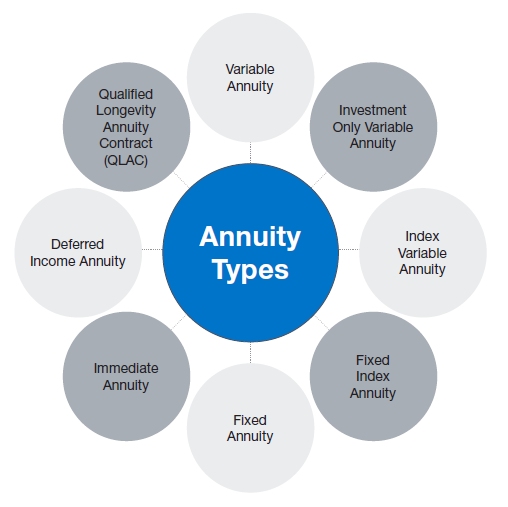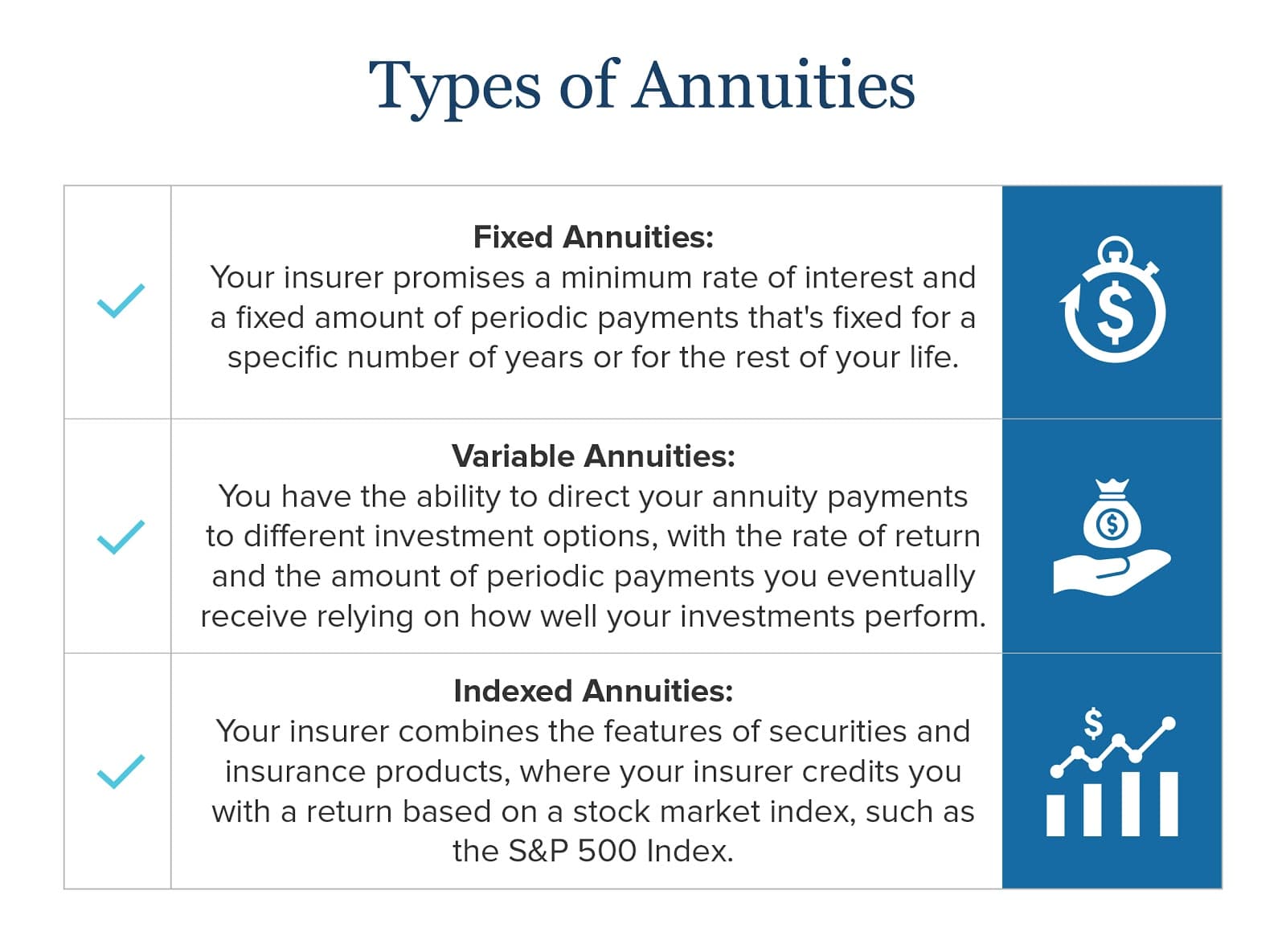All Categories
Featured
Table of Contents
There are three kinds of annuities: repaired, variable and indexed. With a repaired annuity, the insurance firm assures both the rate of return (the rate of interest rate) and the payout to the financier.
With a deferred set annuity, the insurance provider accepts pay you no less than a specified rate of interest as your account is growing. With an immediate fixed annuityor when you "annuitize" your deferred annuityyou get an established fixed quantity of money, generally on a month-to-month basis (comparable to a pension plan).
And, unlike a taken care of annuity, variable annuities do not give any kind of assurance that you'll make a return on your investment. Instead, there's a risk that you can in fact lose money.
Understanding Fixed Annuity Vs Equity-linked Variable Annuity A Comprehensive Guide to Fixed Annuity Vs Equity-linked Variable Annuity Breaking Down the Basics of Variable Annuities Vs Fixed Annuities Features of Fixed Vs Variable Annuity Pros And Cons Why Deferred Annuity Vs Variable Annuity Matters for Retirement Planning How to Compare Different Investment Plans: How It Works Key Differences Between Different Financial Strategies Understanding the Rewards of Fixed Vs Variable Annuity Pros Cons Who Should Consider Fixed Annuity Vs Variable Annuity? Tips for Choosing Choosing Between Fixed Annuity And Variable Annuity FAQs About Planning Your Financial Future Common Mistakes to Avoid When Choosing Fixed Vs Variable Annuity Financial Planning Simplified: Understanding Your Options A Beginner’s Guide to Smart Investment Decisions A Closer Look at How to Build a Retirement Plan
Due to the complexity of variable annuities, they're a leading resource of capitalist grievances to FINRA. Before acquiring a variable annuity, thoroughly checked out the annuity's program, and ask the individual selling the annuity to explain all of the item's functions, riders, costs and limitations. Indexed annuities commonly offer a minimal surefire passion rate integrated with an interest price linked to a market index.
Recognizing the attributes of an indexed annuity can be complicated. There are several indexing approaches firms use to calculate gains and, due to the variety and complexity of the methods utilized to credit rating passion, it's tough to contrast one indexed annuity to an additional. Indexed annuities are normally classified as one of the following two types: EIAs provide a guaranteed minimum interest price (commonly a minimum of 87.5 percent of the premium paid at 1 to 3 percent rate of interest), in addition to an additional rates of interest tied to the performance of one or even more market index.

Traditional investors that value safety and security and stability. Those nearing retired life who desire to shelter their assets from the volatility of the stock or bond market. With variable annuities, you can invest in a variety of protections including supply and mutual fund. Stock exchange efficiency establishes the annuity's value and the return you will certainly receive from the cash you spend.
Comfortable with variations in the stock market and want your investments to keep pace with inflation over a lengthy duration of time. Youthful and desire to prepare financially for retirement by gaining the gains in the supply or bond market over the lengthy term.
As you're building up your retirement savings, there are many methods to stretch your cash. can be particularly valuable cost savings devices since they assure an income quantity for either a collection time period or for the remainder of your life. Dealt with and variable annuities are two choices that provide tax-deferred development on your contributionsthough they do it in various means.
Decoding What Is A Variable Annuity Vs A Fixed Annuity Everything You Need to Know About Pros And Cons Of Fixed Annuity And Variable Annuity Defining the Right Financial Strategy Benefits of Choosing the Right Financial Plan Why Retirement Income Fixed Vs Variable Annuity Can Impact Your Future Fixed Vs Variable Annuities: Explained in Detail Key Differences Between Retirement Income Fixed Vs Variable Annuity Understanding the Rewards of Long-Term Investments Who Should Consider Variable Vs Fixed Annuity? Tips for Choosing the Best Investment Strategy FAQs About Variable Annuity Vs Fixed Indexed Annuity Common Mistakes to Avoid When Planning Your Retirement Financial Planning Simplified: Understanding Your Options A Beginner’s Guide to Fixed Income Annuity Vs Variable Growth Annuity A Closer Look at How to Build a Retirement Plan
A supplies a guaranteed rate of interest rate. Your agreement worth will certainly increase due to the amassing of ensured interest earnings, meaning it will not shed value if the market experiences losses.
A consists of bought the stock exchange. Your variable annuity's financial investment efficiency will influence the size of your savings. It may guarantee you'll get a collection of payouts that begin when you retire and can last the remainder of your life, offered you annuitize (start taking settlements). When you begin taking annuity payments, they will depend upon the annuity worth during that time.
Market losses likely will result in smaller sized payouts. Any type of rate of interest or other gains in either kind of contract are sheltered from current-year taxation; your tax obligation liability will come when withdrawals begin. Let's take a look at the core functions of these annuities so you can make a decision how one or both may fit with your overall retirement strategy.

A set annuity's value will certainly not decrease due to market lossesit's constant and stable. On the other hand, variable annuity values will certainly rise and fall with the efficiency of the subaccounts you elect as the markets fluctuate. Incomes on your taken care of annuity will extremely rely on its gotten price when acquired.
On the other hand, payment on a fixed annuity bought when passion rates are low are most likely to pay earnings at a reduced rate. If the rate of interest is guaranteed for the size of the agreement, revenues will certainly remain constant regardless of the marketplaces or rate task. A set price does not mean that taken care of annuities are risk-free.
While you can't arrive at a fixed price with a variable annuity, you can pick to buy conventional or aggressive funds customized to your risk degree. More conventional financial investment choices, such as short-term bond funds, can help in reducing volatility in your account. Because taken care of annuities provide an established price, dependent upon existing rates of interest, they don't supply that exact same adaptability.
Analyzing Strategic Retirement Planning Key Insights on Fixed Index Annuity Vs Variable Annuity Breaking Down the Basics of Indexed Annuity Vs Fixed Annuity Advantages and Disadvantages of Different Retirement Plans Why Choosing the Right Financial Strategy Is Worth Considering Variable Annuity Vs Fixed Indexed Annuity: Simplified Key Differences Between Variable Vs Fixed Annuities Understanding the Rewards of Long-Term Investments Who Should Consider Fixed Index Annuity Vs Variable Annuity? Tips for Choosing the Best Investment Strategy FAQs About Planning Your Financial Future Common Mistakes to Avoid When Planning Your Retirement Financial Planning Simplified: Understanding Fixed Income Annuity Vs Variable Annuity A Beginner’s Guide to Variable Annuity Vs Fixed Annuity A Closer Look at Indexed Annuity Vs Fixed Annuity

You potentially could earn a lot more lengthy term by taking additional risk with a variable annuity, but you could likewise lose cash. While dealt with annuity contracts avoid market danger, their trade-off is much less growth potential.
Investing your variable annuity in equity funds will certainly give even more prospective for gains. The costs connected with variable annuities might be higher than for various other annuities.
The insurance coverage company might impose surrender charges, and the IRS might levy an early withdrawal tax obligation penalty. Surrender fees are described in the agreement and can differ. They begin at a specific percentage and afterwards decline gradually. As an example, the surrender penalty may be 10% in the very first year but 9% the following.
Annuity revenues undergo a 10% very early withdrawal tax charge if taken prior to you get to age 59 unless an exemption applies. This is imposed by the IRS and relates to all annuities. Both dealt with and variable annuities provide choices for annuitizing your balance and transforming it right into an ensured stream of life time revenue.
Exploring Deferred Annuity Vs Variable Annuity A Closer Look at How Retirement Planning Works What Is Variable Annuities Vs Fixed Annuities? Advantages and Disadvantages of Different Retirement Plans Why Choosing the Right Financial Strategy Is a Smart Choice Tax Benefits Of Fixed Vs Variable Annuities: Simplified Key Differences Between Different Financial Strategies Understanding the Rewards of Long-Term Investments Who Should Consider Fixed Annuity Or Variable Annuity? Tips for Choosing Variable Annuities Vs Fixed Annuities FAQs About Tax Benefits Of Fixed Vs Variable Annuities Common Mistakes to Avoid When Planning Your Retirement Financial Planning Simplified: Understanding Fixed Index Annuity Vs Variable Annuity A Beginner’s Guide to Smart Investment Decisions A Closer Look at How to Build a Retirement Plan
You might decide to utilize both repaired and variable annuities. However if you're picking one over the various other, the distinctions matter: A might be a much better choice than a variable annuity if you have a more conservative threat resistance and you seek foreseeable interest and primary protection. A may be a much better alternative if you have a higher threat tolerance and want the possibility for long-term market-based development.
There are various types of annuities that are developed to serve various purposes. A fixed annuity guarantees payment of a collection amount for the term of the contract.
A variable annuity fluctuates based upon the returns on the common funds it is bought. Its worth can rise or down. An immediate annuity starts paying out as soon as the customer makes a lump-sum settlement to the insurance firm. A deferred annuity starts settlements on a future date set by the purchaser.
Annuities' returns can be either fixed or variable. With a dealt with annuity, the insurance policy business ensures the buyer a particular settlement at some future date.
Table of Contents
Latest Posts
Breaking Down Fixed Annuity Vs Equity-linked Variable Annuity A Comprehensive Guide to Investment Choices What Is the Best Retirement Option? Pros and Cons of Fixed Vs Variable Annuity Pros Cons Why F
Decoding How Investment Plans Work A Comprehensive Guide to Fixed Vs Variable Annuity What Is Fixed Income Annuity Vs Variable Growth Annuity? Benefits of Choosing the Right Financial Plan Why Choosin
Exploring Deferred Annuity Vs Variable Annuity Everything You Need to Know About Financial Strategies Breaking Down the Basics of Investment Plans Benefits of Fixed Index Annuity Vs Variable Annuities
More
Latest Posts